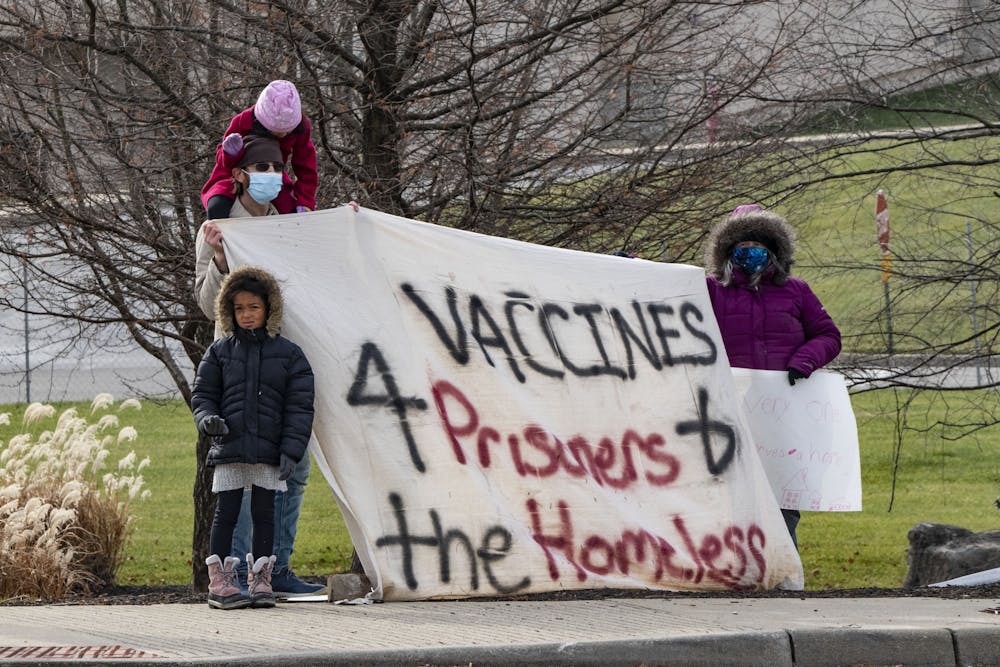In the last month, the COVID-19 vaccine has become available to most Hoosiers. As a vulnerable group facing great exposure to the virus, there is no doubt that people experiencing homelessness deserve equal access to the vaccine.
However, many vaccination plans do not include necessary steps for the safety of the unhoused community. Only 20 states have vaccination plans that include shelters for individuals experiencing homelessness, and Indiana is one of them.
Indiana’s vaccination plan is still not sufficient. Only addressing the need for unhoused individuals residing in shelters to be vaccinated is a grave oversight of the unhoused community living outside of shelters.
The importance of vaccination in the unhoused community cannot be understated. The conditions in shelters for individuals experiencing homelessness often promote the spread of COVID-19. Social-distancing and masks can be required in shelters, but factors such as small spaces and overflow of individuals seeking shelter cannot be prevented in many situations. The Centers for Disease Control and Prevention even modified the distancing guidelines for shelters, recommending only three feet between beds.
“You got one shelter where you do not have to wear a mask. You got this shelter that has to wear a mask. Wheeler, you have to wear a mask,” said Robert “Pops” Downham, who helped found the Bloomington Homeless Coalition in 2018.
Shelters cannot be seen as the by-all, end-all solution for unhoused individuals. Many people experiencing homelessness prefer to reside outdoors because of shelter requirements and conditions. For example, some shelters require sobriety, individuals diagnosed with schizophrenia are often not comfortable with overcrowded residencies, and some shelters separate residents based on gender.
Even fewer states’ vaccination plans include steps for unhoused individuals living outside of shelters. Although Indiana’s vaccination plan addresses the unhoused population as “those at elevated risk of transmission,” the plan includes only steps for vaccinations in shelters.
There are immense risks of COVID-19 transmission associated with sleeping outside or in an encampment setting, according to the CDC. However, the CDC advises against the destruction of encampment sites because individuals residing in the encampment will disperse throughout the community, potentially spreading the virus.
Bloomington completely disregarded the CDC’s recommendation when police cleared the encampment site at Switchyard Park earlier this year. Ignoring the protests of the Bloomington community, police officers and city employees continued to drag tents and utility trailers out of the park.
Despite the city’s mistreatment of the unhoused, the Bloomington community is working to ensure the safety of unhoused individuals and have surpassed recommendations for the unhoused community in Indiana’s vaccination plan.
IU Health is providing rides for unhoused individuals to vaccine appointments and also partnering with the Monroe County Health Department to administer vaccines in Bloomington shelters.
“We’ve had a couple of vaccine clinics so far,” said Jonathan Meador, an employee of Friend’s Place Emergency Shelter in Bloomington. “One was at a Friend’s Place a couple of weeks ago, and we were able to get everybody that wanted a vaccine, we were able to vaccine them. Then we had a second vaccine clinic, I think it was last week, at New Hope, so between the two of those, we got a lot of people done.”
Additionally, Friend’s Place Emergency Shelter has specific employees for vaccine outreach. There is a specific outreach case manager whose main role is to coordinate vaccine appointments, give rides to vaccine appointments and make sure people get their follow-ups on time, Meador said.
As access to vaccines increases, vaccination requirements may become commonplace in shelters. This could be a barrier to access for those seeking shelter.
“As far as I know, the shelters now are making them get vaccinated, or they are not letting them stay at the shelter,” Downham said.
Friend’s Place Emergency Shelter does not require the vaccine, but it is heavily recommended.
It is vital that unhoused individuals are vaccinated, no matter if they choose to reside in or outside of a shelter.
Indiana cities must do more to protect the unhoused population. The Commission on Homelessness in Evansville, Indiana, has been working to develop a plan to include the unsheltered population of the unhoused community, but Mayor Lloyd Winnecke denied a proposition by County Commissioner Cheryl Musgrave to pay people experiencing homelessness to get the vaccine, which would have been a productive way to incentivize vaccination.
The lives of the unhoused community are on the line, and this crisis will not be solved by doing the bare minimum. Indiana must prioritize the unhoused population, sheltered or unsheltered.
Russ Hensley (he/him) is a sophomore studying mathematics, international law and institutions and Chinese. He is a member of IUSG on the Diversity, Equity and Inclusion Committee and a curator for TEDxIU. He aspires to work in gender and sexuality law.






